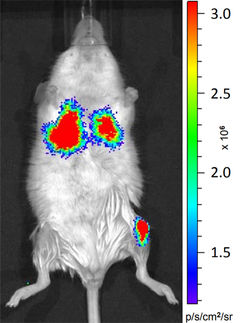Haematopoietic stem cell transplantation increases survival in systemic sclerosis patients
Initial results from an international, investigator-initiated, open label phase III trial were presented at EULAR 2012, the Annual Congress of the European League Against Rheumatism. Data indicate that haematopoietic stem cell transplantation (HSCT) results in better long term survival than conventional treatment for patients with poor prognosis early diffuse cutaneous systemic sclerosis.
The ASTIS (Autologous Stem Cell Transplantation International Scleroderma) trial enrolled more than 150 patients between 2001 and 2009, and randomised patients to the HSCT arm or to intravenous pulse cyclophosphamide treatment. As of May 1, 2012, significantly more deaths have occurred in the conventional treatment group. Half of the deaths in the HSCT group occurred early and were deemed treatment-related according to an independent data monitoring committee. In the conventional treatment group in contrast, none of the deaths were deemed to be treatment-related; but more deaths occurred later and most were related to progressive disease.
"Systemic sclerosis is a debilitating disease that can lead to heart, lung or kidney failure and premature death, especially in patients who have the diffuse cutaneous form of the condition, where skin thickening is more generalised and involvement of vital organs more common. The ASTIS study shows that such patients may benefit from early intensive immunosuppressive treatment," said Professor Jaap van Laar from Newcastle University, Professor Dominique Farge, Assistance Publique Hopitaux de Paris (Sponsor in France, Paris 7 University) and Professor Alan Tyndall from Basel University, on behalf of their colleagues from the EBMT EULAR Scleroderma Study Group. "These initial results are very encouraging and will help identify patients who benefit from stem cell transplantation."
The ASTIS trial was a unique collaborative project of 27 multidisciplinary teams from 10 countries conducted under the auspices of two leading organisations in the respective fields, the European Group for Blood and Marrow Transplantation (EBMT) and the European League Against Rheumatism (EULAR). The primary endpoint of the trial was event-free survival, defined as survival until death or development of major organ failure.
Other news from the department science

Get the life science industry in your inbox
By submitting this form you agree that LUMITOS AG will send you the newsletter(s) selected above by email. Your data will not be passed on to third parties. Your data will be stored and processed in accordance with our data protection regulations. LUMITOS may contact you by email for the purpose of advertising or market and opinion surveys. You can revoke your consent at any time without giving reasons to LUMITOS AG, Ernst-Augustin-Str. 2, 12489 Berlin, Germany or by e-mail at revoke@lumitos.com with effect for the future. In addition, each email contains a link to unsubscribe from the corresponding newsletter.





















































